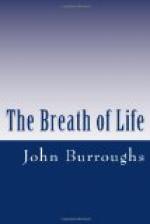The air begins at once to act chemically upon the blood in the lungs of the newly born, and the gastric juices to act chemically upon the food as soon as there is any in the stomach of the newly born, and breathing and swallowing are both mechanical acts; but what is it that breathes and swallows, and profits by it? a machine?
Maybe the development of life, and its upward tendency toward higher and higher forms, is in some way the result of the ripening of the earth, its long steeping in the sea of sidereal influences. The earth is not alone, it is not like a single apple on a tree; there are many apples on the tree, and there are many trees in the orchard.
THE END
INDEX
Adaptation, 184, 215, 216.
Alpha rays, 60, 199.
Aquosity, 127, 128, 141-143.
Aristotle, 240.
Asphalt lake, 123.
Atoms, different groupings of, 56-60;
weighed and counted, 60, 61;
indivisibility, 61;
the hydrogen atom, 65;
chemical affinity, 193-195;
photography of, 199, 200;
form, 203;
atomic energy, 204;
qualities and properties of bodies in
their keeping, 204;
unchanging character, 205, 206;
rarity of free atoms, 209;
mystery of combination, 210.
Autolysis, 169.
Balfour, Arthur James, on Bergson’s “Evolution Creatrice,” 15.
Bees, the spirit of the hive, 82.
Benton, Joel, quoted, 70.
Bergson, Henri, 129, 173, 263;
on light and the eye, 5;
his view of life, 14-16, 27-29, 221, 237,
238;
on the need of philosophy, 85, 86;
on life on other planets, 87;
his method, 109, 110;
the key to his “Creative Evolution,”
132;
on life as a psychic principle, 162;
his book as literature, 238.
Beta rays, 61, 199, 201.
Biogenesis, 25. See also Life.
Biophores, 217.
Body, the, elements of, 38, 39;
the chemist in, 152, 153;
intelligence of, 153, 154;
a community of cells, 157, 158;
viewed as a machine, 212-214, 224.
Brain, evolution of, 288.
Breathing, mechanics and chemistry of, 50-54, 213.
Brooks, William Keith, quoted, 128, 236.
Brown, Robert, 191;
the Brunonian movement, 167, 172, 191.
Brunonian movement, 167, 172, 191.
Butler, Bishop, imaginary debate with Lucretius, 219, 220.
Carbon, 38, 56, 59;
importance, 208.
Carbonic-acid gas, 52, 53.
Carrel, Dr. Alexis, 98, 148.
Catalysers, 135, 136.
Cell, the, 83-85, 90, 96, 97, 180;
Wilson on, 95;
living after the death of the body, 98;
Prof. Benjamin Moore on, 107;
nature of, 113;
aimless multiplication, 148, 233;
the unit of life, 156;
communistic activity, 157, 158, 184;
a world in little, 170;
mystery of, 175;
different degrees of irritability, 216,
217.




